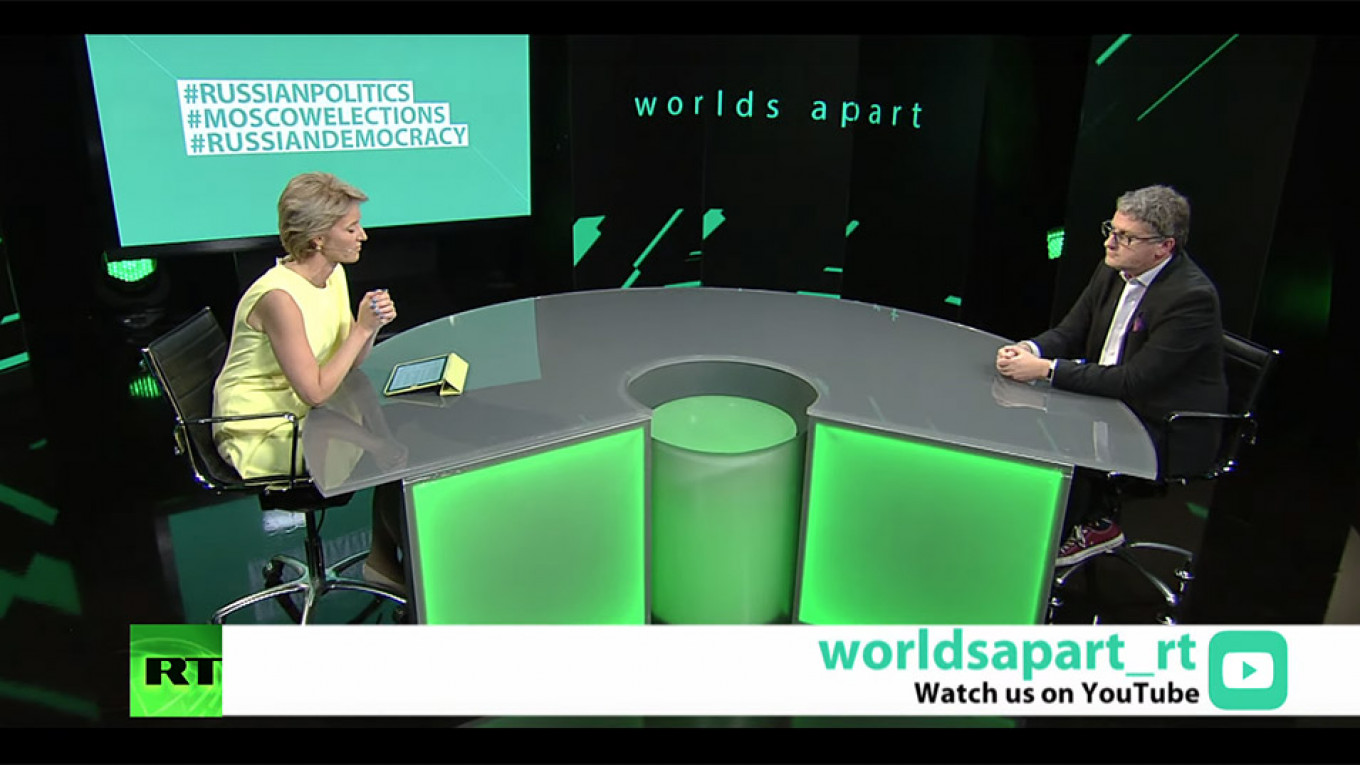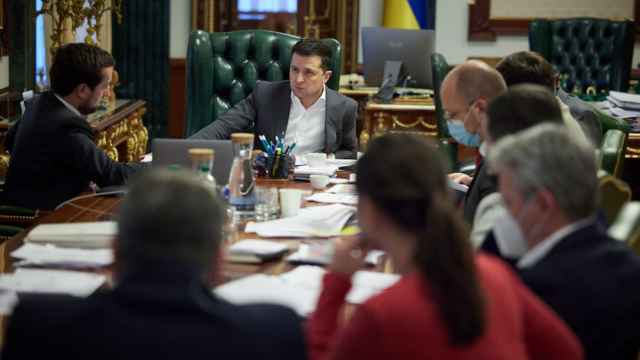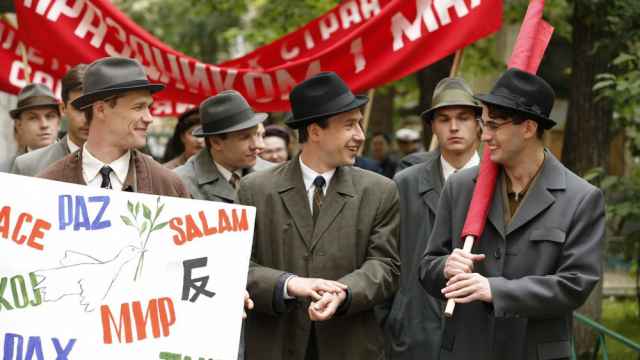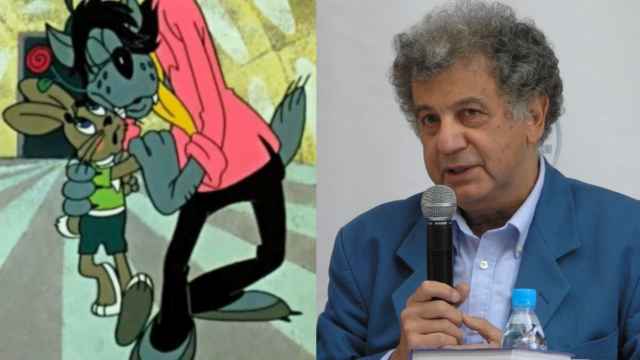Last week I did something that will no doubt have some calling me a naive instrument of the Kremlin at best, a willful fifth columnist at worst. My sin? Talking to the Russian state television channel RT, which even its head, Margarita Simonyan, has called an “information weapon.”
So why did I do it?
First of all, because I think there are three RTs, not one. There is, indeed, the RT that is a toxic font of bilious propaganda and hateful nonsense of every kind. Not wanting to see my words edited to suit others’ agendas or to be shouting it out with pseudo-pundits steeped in every conspiracy theory from QAnon to the belief that Ukraine’s Euromaidan was organized by MI6 and the CIA, this is the RT you couldn’t pay me to be on. And I should mention, I wasn’t paid at all.
Then there is the RT, especially on its online presence, that is just sensationalist clickbait. Irritating, but essentially harmless. Sadly, in today’s age of the attention economy, even the most reputable media services (yes, BBC World Service, I’m looking at you) have an element of this.
Finally, there is the RT that clearly has a particular ideological-nationalist stance (again, not something exactly unknown in other television networks) but seeks at the same time to be serious and meaningful. I go on the Oksana Boyko show because the host is punchy, combative even, but committed to a real conversation.
I get to say what I want to say. In past shows I’ve been able to talk about the illegal annexation of Crimea — in those words — on a network funded by the Kremlin, and this time we discussed the heavy-handed suppression of the Moscow protests, on how Russia could not call itself democratic so long as the Kremlin vets candidates and why I thought Moscow was wasting money on security spending. The show is not edited, so if my perspective doesn’t get through, that’s all on me.
And this leads me to a second reason. If we in the West are in an information war with Russia, then why would we abandon “territory” to the other side? The usual criticism is that by going on RT I somehow legitimate it. Apart from the fact that I find it flattering but implausible to think that my participation makes any real difference, the fact is that RT already has its audience, and they are attracted to it not by the credentials of its guests but its very upstart, outsider, counter-conventional status.
Too often, its “Question More” premise is thus an excuse to showcase all kinds of marginal and ill-informed figures eager to peddle discredited theories and outright fabrications. Why surrender RT’s information space to them? If more mainstream voices choose to exclude themselves from RT, the network and its audience will not disappear, it will simply become even less diverse.
It’s all very well calling those who watch RT “deplorables” to use Hillary Clinton’s fateful words, but if we do that, we shouldn’t expect them to change their minds any day soon.
Finally, much is made of the way that in today’s social-media-moderated world, we live in bubbles of comfortable conformity. It’s not just on Twitter and Facebook, though, that this happens.
For those of us Westerners who work in and on Russia, it’s all too easy to end up only interacting with those Russians who talk and think like us: West-leaning liberals, critics of the regime. On one level, that’s entirely understandable. Let’s be honest, we all like our assumptions and prejudices to be validated and confirmed, and these people are also that much more willing to talk to us.
That’s also a mistake.
The people we need to talk to are those who don’t agree with us, who don’t share our sense of the world. Maybe we can convince them, maybe not, but that is not the real issue. Their views may sometimes seem bizarre to us or muddle-headed, paranoid or downright repulsive, but they matter. In some cases, these are people whispering in Putin’s ears and shaping his worldview, in others, they are those turning out to vote for the regime.
I’d be a happier if more Western embassies put greater effort into reaching out to their critics than their friends, for example. This goes both ways, of course: I’d also be greatly reassured if Putin spoke more often with people who were not his corrupt cronies and security officers.
In my own much smaller way, then, talking to RT is also part of a wider effort to try and avoid being totally cocooned within a single information space. I learn something from the questions I am asked and hopefully I can also help puncture some assumptions on the part of the viewers.
Will I do it again? I don’t know. I confess I can get fed up of “gotcha”-style interview questions and that inevitable sense of taking a stroll across a political minefield. Much will really depend on where I see the balance moving between those “three RTs.” It’s certainly not something I’m ruling out, though.
The corollary of the truism that elections are won by those who turn up is, after all, that conversations are won by those who take part. But I know that will not convince those who view this rather in terms of a Manichean “us and them” divide. Let the chorus of “useful idiot” begin.
A Message from The Moscow Times:
Dear readers,
We are facing unprecedented challenges. Russia's Prosecutor General's Office has designated The Moscow Times as an "undesirable" organization, criminalizing our work and putting our staff at risk of prosecution. This follows our earlier unjust labeling as a "foreign agent."
These actions are direct attempts to silence independent journalism in Russia. The authorities claim our work "discredits the decisions of the Russian leadership." We see things differently: we strive to provide accurate, unbiased reporting on Russia.
We, the journalists of The Moscow Times, refuse to be silenced. But to continue our work, we need your help.
Your support, no matter how small, makes a world of difference. If you can, please support us monthly starting from just $2. It's quick to set up, and every contribution makes a significant impact.
By supporting The Moscow Times, you're defending open, independent journalism in the face of repression. Thank you for standing with us.
Remind me later.








